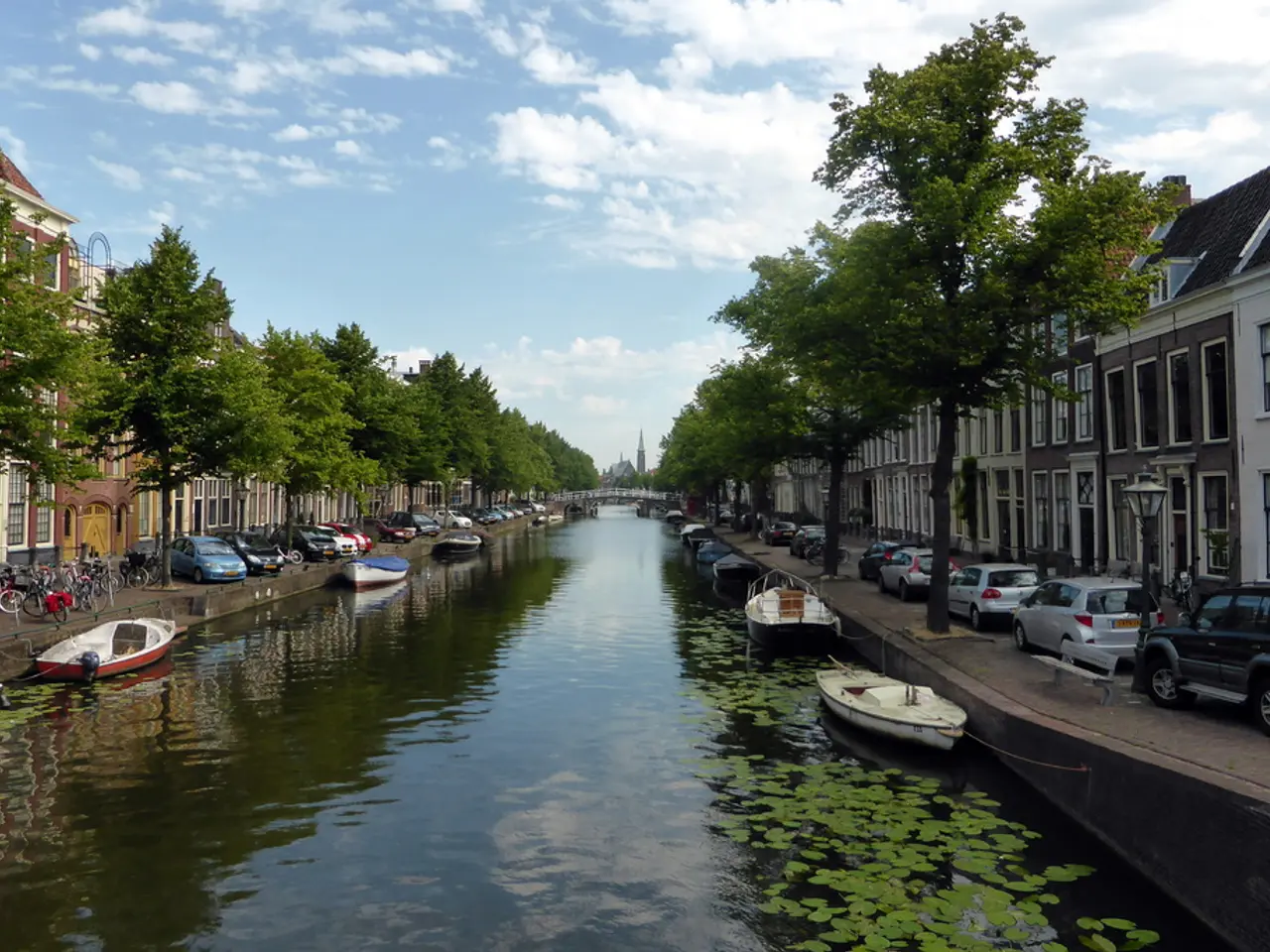Amidst Apocalyptic Upheavals: Giya Kancheli's Musical Voice Echoes, Straddling Petitions and Protests
In the Hush of Time: Giya Kancheli's Chamber Music and its haunting Relevance
On the chill May night of '25, the Georgian Philharmonic Orchestra Auditorium echoed with sounds that stung the soul, stirring up a maelstrom of emotions that lingered long after the concert had concluded. Mezzo-soprano Natalia Kutateladze, violist Giorgi Zagareli, and pianist Nikoloz Rachveli, the pioneering trio, did not merely perform works by Giya Kancheli, they channeled the spirits of a tumultuous century. That night, the concert transformed into a mournful chorus of archeology, a rite of passage for a society wrestling with its own past narratives. But why does Kancheli's music, with its profound peculiarity, still echo in our hearts today? How does his muted anguish find resonance in our hurried, noise-saturated era?
A Whisper in the Age of ClamorIn an world where sound is a constant, Kancheli's music dares to hush. His chamber works are vehicle for radical silence, punctuated by sudden cries of torment. As ethnomusicologist Caroline Bithell argues, "silence is the presence of repression and memory." Kancheli, perhaps more than any other post-Soviet composer, understood this grim truth.
The silence in Kancheli's compositions does not waver; it evokes the silence that was bludgeoned into citizens living under the oppressive hand of Soviet rule. His use of spectral harmonies and slow, meandering flows is an eloquent rebuke of the teleology and bombast associated with Soviet musical ideology. In place of progress, Kancheli's music prefers lingering-a silent defiance laced with Michel Foucault's evasive subversion.
Between the Aisles of Sanctity and SorrowKancheli, a purveyor of the divine and the despairing, often dismissed interpretations of his work as "religious." Instead, he preferred the term "spiritual." This distinction is crucial, for it reveals a deep keenness for introspection, a longing for inner enlightenment that transcends the rigid hierarchies of institutionalized dogma.
Georgia's cultural identity is forever entwined with spirituality, echoing through its conversion to Christianity in the 4th century and its defiant defiance of Ottoman and Soviet secularism. In this celestial land, where music, mysticism, and memory have always blurred together, Kancheli's chamber works emerge as that threshold space-that liminality-where new cultural meanings can be forged. For Kancheli, the music is a testament to life's incomprehensible complexities-a passage that refuses to be tidied away in easy resolutions.
A Space to Hold the Trials of MemoryThe chamber music form, with its intimate, confined nature, fosters an atmospheric resonance that mirrors the human psyche. It is reminiscent of Freud's "Wunderblock," a metaphor for memory as a multi-layered text that preserves fragments too sensitive for one to comprehend fully. Kancheli's sparse textures and recurring motifs feel like the preserved echoes of repressed trauma-a testament to the unhealed wounds and dark chapters of history.
Philosopher Walter Benjamin once described history as "a constellation of dangers." Kancheli's music encapsulates this danger beautifully-it unveils the hurts of the past, bringing long-forgotten, repressed memories to the surface. When Rachveli's piano shatters the silence with sudden discord or irony, it is the eruption of cultural trauma. Performing Kancheli's works in a concert hall imbues the space with gravity-it transforms into a courtroom, a chapel, a vault of forgotten recollections.
From the Post-Soviet Era to the Post-Human AgeWhy does Kancheli still hold sway in '25? Because his music speaks to something deeper, something that transcends both the virtual world of AI-generated compositions and the flattened optimism of late-capitalist aesthetics. In a world where music is slowly becoming a distant echo, drowned by the noise of entertainment and the algorithmic predictability of technology, Kancheli's work stands as a beacon of slowness, reflection, and dynamic ambiguity.
His music cannot be quantified in a data-driven world. It does not easily yield to quantitative analysis, playlisting, or viral trends. This is its power-its defiance of the superficial and the fleeting. As theorist Byung-Chul Han notes in "The Scent of Time," our age suffers from a temporal crisis, where acceleration has replaced depth. Kancheli's music slows time-it allows us to explore the recesses of history, the weight of loss, the paradoxes of existence, and the enormity of grief.
A Chorus of VulnerabilityMezzo-soprano Natalia Kutateladze did not belle out Kancheli's textures; she emerged from within them. Her vocal presence was defined by absence, her tone floating, ebbing, and surging like a tender echo of the past. In pieces where Kancheli incorporates wordless vocal lines or sparse words, Kutateladze utilized the fragile vessel of the human voice as an instrument of vulnerability.
Her nuanced control of breath and silence fashioned the ephemeral spaces in Kancheli's music-the moments where meaning evaporated just as it began to form. During parts when Kancheli employs disembodied vocal lines or spare texts, Kutateladze weaved the human voice into a delicate fabric of melancholy.
Violist Giorgi Zagareli's performance was the emotional bedrock of the evening. His skillful hand on the viola, often overshadowed in the grandeur of orchestral settings, lent Kancheli's chamber music an earthy, poignant weight. The viola's mournful, understated, and introspective tone resonated perfectly with Kancheli's somber aesthetic.
Zagareli played with a tone that wavered between the sweetness of reminiscence and the melancholy of loss. In Kancheli's slow ebbs and sharp flights, Zagareli's mastery was evident. He handled the score's subtle nuances with reverence, illuminating each moment with a deft, thoughtful touch.
Nikoloz Rachveli, both pianist and artist director of the evening, acted as the concert's maestro. His clear understanding of Kancheli's vision propelled the musicians to dig deep, uncovering the raw emotions hidden within the scores. Rachveli's piano performance was crystalline, meticulous, and subdued-a seeming contradiction that fit perfectly with Kancheli's vision.
In pieces where the piano serves as a heartbeat or tolling anguish, Rachveli created sonic vistas. His keen awareness of the spaces between the notes-the in-betweens, so to speak-elevated the music, turning it into a symphony of shared vulnerability.
ChorusUnder the watchful eye of the legendary Nani Bregvadze, the audience bore witness to a spontaneous outpouring of emotion. Her voice, aged yet unrelenting, carried the weight of generations as she sang "Ak aris"-a song entwined in the collective Georgian memory. In that moment, Bregvadze's voice transcended performance, becoming a living testament to Kancheli's own essence: tender, heartbreaking, eternal. The concert ended not with a thunderous finale, but with a song that felt like a return-to roots, to silence, to home.
The audience rose as one, swept away by the power and poignancy of the music, the voice, the emotion. They clapped and cheered, not just for a beloved artist, but for the collective memory, the shared anguish, the quiet strength it took to bear witness to the past.
In 2025, Giya Kancheli's chamber music remains relevant, powerful, haunting. His compositions are at once a window into the past and a testament to the resilience of the human spirit. They serve as a reminder that time, like history, is not a narrative to be consumed, but an experience to be cherished, honored, and reckoned with. To listen to Kancheli today is to practice an ethical listening-to remember, to heal, and to move forward, together.
By Ivan Nechaev
concert TbilisiGeorgian Philharmonic Orchestra AuditoriumGiorgi ZagareliGiya KancheliIvan NechaevNatalia KutateladzeNikoloz Rachveli
- In a world where music is often overshadowed by the noise of entertainment and the algorithmic predictability of technology, Giya Kancheli's chamber music stands as a beacon of slowness, reflection, and dynamic ambiguity, even in 2025.
- The silence in Kancheli's compositions serves as an eloquent rebuke of the teleology and bombast associated with Soviet musical ideology, echoing the silence that was bludgeoned into citizens living under oppressive rule in Georgia during that time.
- The chamber music form, with its intimate, confined nature, fosters an atmospheric resonance that mirrors the human psyche, making Kancheli's works feel like a preserved echo of repressed trauma, a testament to the unhealed wounds and dark chapters of history.








